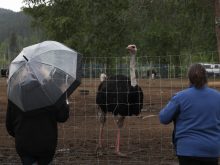Spring planting work could soon start to bring unintended gifts left by wild birds from fields into farmyards, Ontario’s poultry and egg sectors warn, as more cases of avian flu are confirmed at poultry farms across the country.
The Canadian Food Inspection Agency on Thursday reported three additional outbreaks of H5 avian influenza in commercial poultry flocks have been confirmed since the Easter long weekend — one each in:
- central Alberta’s Kneehill County, between Calgary and Red Deer, confirmed Wednesday with highly pathogenic H5N1;
- the Regional Municipality of York in the Greater Toronto Area (GTA), confirmed Thursday with high-path H5N1; and
- Quebec’s Estrie region, where an H5 type of avian flu was confirmed Thursday in the regional municipality (RCM) of Les Sources, north of Sherbrooke.
Read Also

More Canadian companies at Agritechnica 2025
A record number of Canadian agriculture machinery and tech companies are at Agritechnica 2025, with exporters being more aggresive looking for new markets.
The agency didn’t say Thursday what type of birds or how many were affected in any of those outbreaks, nor did it say what subtype or pathogenicity of the virus was found in the new Les Sources case. The Les Sources case is the second this month in that RCM, while the new Kneehill County case marks the third there.
The new cases bring the total of avian flu outbreaks in commercial Canadian poultry flocks so far this year to 34: 14 in southern Ontario, 12 in central and southern Alberta, four in Quebec’s Estrie, two in western Nova Scotia and one each in west-central Saskatchewan and in B.C.’s Okanagan.
CFIA also continues setting up primary control zones (PCZs) surrounding infected premises, in which all movement of domestic birds and poultry products — whether in, out or through — is “strictly controlled” and requires CFIA permits. As of Tuesday, CFIA had officially set up 31 PCZs across the country.
As of Wednesday, each of the 10 provinces has also now confirmed cases of avian flu in wild birds and/or non-commercial or backyard flocks in this latest run of high-path avian flu through Canada.
With strains of high-path avian flu known to have been airborne for months now in migratory wild birds in North America, and spring planting coming up quick, Ontario’s Feather Board Command Centre said in a new advisory Tuesday it’s “important to realize that tilling and planting equipment will cover every inch of fields that may have been contaminated by wild birds.”
The avian flu virus can survive for “extended periods of time” in the environment, particularly in cooler weather, according to the FBCC, the feather sector agency monitoring bird disease outbreaks in Ontario and globally.
Water, wet soil and feces contaminated with the virus can thus linger after a migrating flock has moved on, the centre said. Soil and wild bird feces can stick to tires and undercarriages of field equipment, ATVs and other vehicles and be “easily” spread to other locations.
To reduce the risk of spreading the virus, the FBCC said, farmers should wash vehicles between farms, paying close attention to the vehicle tires and wheel wells. Visible mud and other “organic matter” should be removed from field footwear, which should then be scrubbed with a brush and hose, especially in the bottom treads.
All equipment used on-farm that could become contaminated should be cleaned, the centre said, and planting and tilling equipment should be kept away from poultry barns as well as driveways and any other areas where service vehicles come through to attend poultry premises.
If possible, the FBCC said, farmers should avoid driving near any barns that contain live birds. If need be, they should drive slowly to keep from kicking up dust, and should avoid parking near exhaust fans and air inlets except when required for loading or unloading.
Also where possible, poultry producers will want to close curtains on the side of a barn facing a field in which field work or tillage is taking place, particularly if it’s in dry and/or windy conditions.
After using field equipment, farmers should shower and change clothing and boots before entering a poultry barn, the centre said.
As well, the FBCC said, farms should keep records identifying who has been on-farm and where and when equipment and vehicles have travelled. — Glacier FarmMedia Network












